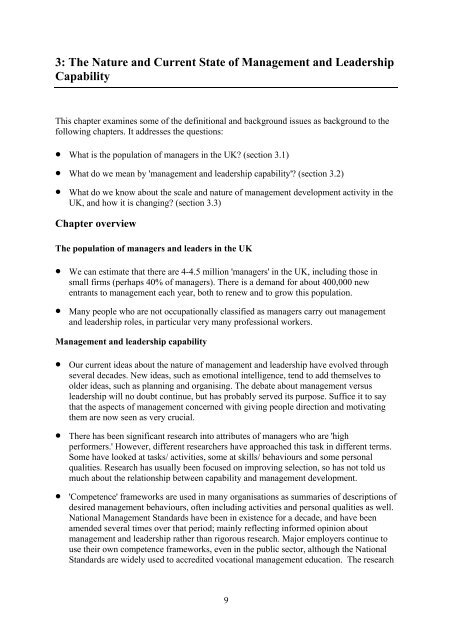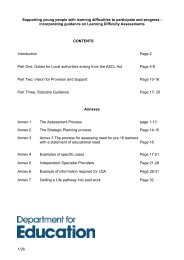The Development of Management and Leadership Capability and its ...
The Development of Management and Leadership Capability and its ...
The Development of Management and Leadership Capability and its ...
You also want an ePaper? Increase the reach of your titles
YUMPU automatically turns print PDFs into web optimized ePapers that Google loves.
3: <strong>The</strong> Nature <strong>and</strong> Current State <strong>of</strong> <strong>Management</strong> <strong>and</strong> <strong>Leadership</strong><br />
<strong>Capability</strong><br />
This chapter examines some <strong>of</strong> the definitional <strong>and</strong> background issues as background to the<br />
following chapters. It addresses the questions:<br />
• What is the population <strong>of</strong> managers in the UK? (section 3.1)<br />
• What do we mean by 'management <strong>and</strong> leadership capability'? (section 3.2)<br />
• What do we know about the scale <strong>and</strong> nature <strong>of</strong> management development activity in the<br />
UK, <strong>and</strong> how it is changing? (section 3.3)<br />
Chapter overview<br />
<strong>The</strong> population <strong>of</strong> managers <strong>and</strong> leaders in the UK<br />
• We can estimate that there are 4-4.5 million 'managers' in the UK, including those in<br />
small firms (perhaps 40% <strong>of</strong> managers). <strong>The</strong>re is a dem<strong>and</strong> for about 400,000 new<br />
entrants to management each year, both to renew <strong>and</strong> to grow this population.<br />
• Many people who are not occupationally classified as managers carry out management<br />
<strong>and</strong> leadership roles, in particular very many pr<strong>of</strong>essional workers.<br />
<strong>Management</strong> <strong>and</strong> leadership capability<br />
• Our current ideas about the nature <strong>of</strong> management <strong>and</strong> leadership have evolved through<br />
several decades. New ideas, such as emotional intelligence, tend to add themselves to<br />
older ideas, such as planning <strong>and</strong> organising. <strong>The</strong> debate about management versus<br />
leadership will no doubt continue, but has probably served <strong>its</strong> purpose. Suffice it to say<br />
that the aspects <strong>of</strong> management concerned with giving people direction <strong>and</strong> motivating<br />
them are now seen as very crucial.<br />
• <strong>The</strong>re has been significant research into attributes <strong>of</strong> managers who are 'high<br />
performers.' However, different researchers have approached this task in different terms.<br />
Some have looked at tasks/ activities, some at skills/ behaviours <strong>and</strong> some personal<br />
qualities. Research has usually been focused on improving selection, so has not told us<br />
much about the relationship between capability <strong>and</strong> management development.<br />
• 'Competence' frameworks are used in many organisations as summaries <strong>of</strong> descriptions <strong>of</strong><br />
desired management behaviours, <strong>of</strong>ten including activities <strong>and</strong> personal qualities as well.<br />
National <strong>Management</strong> St<strong>and</strong>ards have been in existence for a decade, <strong>and</strong> have been<br />
amended several times over that period; mainly reflecting informed opinion about<br />
management <strong>and</strong> leadership rather than rigorous research. Major employers continue to<br />
use their own competence frameworks, even in the public sector, although the National<br />
St<strong>and</strong>ards are widely used to accredited vocational management education. <strong>The</strong> research<br />
9
















